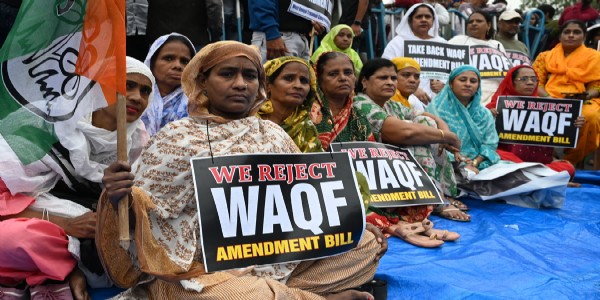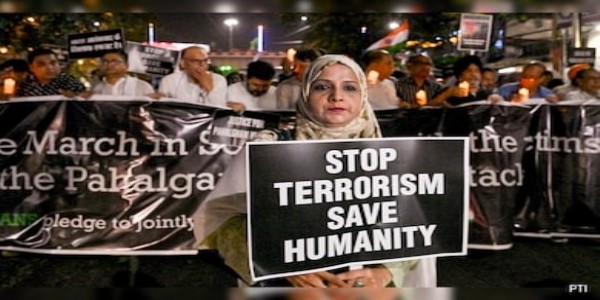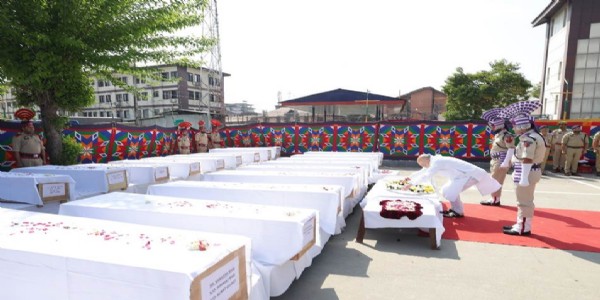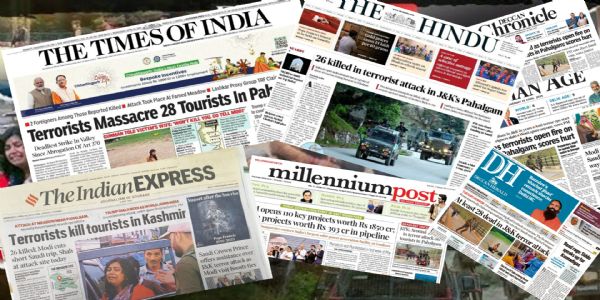The Miracle Continues
Total Views | 268
The world’s largest democracy has completed its 18th Bharatiya nationwide Lok Sabha election. A Herculean task garnering an enormous consensus of as many as 140 crore peoples’ genre abandoned has to will was successfully materialized without bloody violence. The entire saga passed quite peacefully without noteworthy incidences of skirmishes. The whole world was watching for the breathtaking moments of the general will being expressed. By any standard one has to admit that conducting the election of the representatives from amongst a huge population of 140 Crores is not an easy event. The election program was spread over a month and a half. Incidentally, this is also evidence of how democracy and peace are imbibed in the genes of the people of Bharat. During around 35 days barring a few negligible skirmishes, the election of 543 representatives representing 140 crores was carried out without violence.
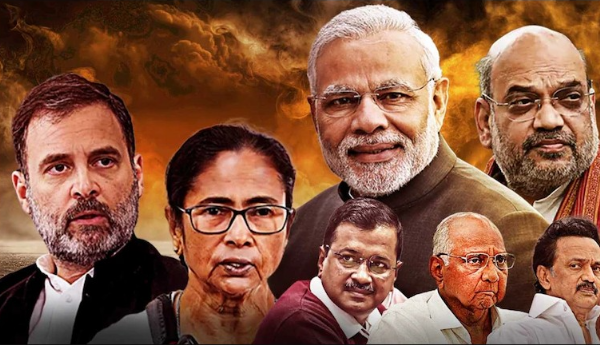
This is what Bharat is.
Since the olden times Bharat, Bharatiya society, and Bhartiya people were known for their patience and tolerance at times became a suicidal act. Belligerent gangs and Vikings from various parts of the world had constantly invaded and destroyed the Bharatiya land and property, looted the people, and molested the womenfolk. It is important to note that in spite of several invasions and bloody wars thrust upon the Bhartiya civilization, the spirit of Bharatiya ethos was never destroyed on the contrary the invaders and the alien forces were absorbed in, so much so, that the aliens lost their own identity. The type of integrations which the world witnessed has become a matter of surprise raising several question marks.
The future of the nation needs courageous and bold decisions in every field of activity to garner glory and plenty. The general election to the central legislature at New Delhi has been very well administered and followed without finding it necessary to resort to constitutional support of Bharat. Although the people of different religions were meted out treatment in every field of socio-political life based on “all are equal before the law”, for the last 75 years i.e. since 1947, the 2024 general elections showed a small crack in the spirit and the body of the Constitution. Some political parties including a national party which once upon a time a national political party which governed Bharat and had launched great agitations and satyagraha all over Bharat against the British imperial power signaled a special favour i.e.drastic change in the Constitution which would lead to far-reaching effects and perhaps would destroy the very Bhartiyatva of Bharat.
Indian National Congress and Samajwadi Party from U.P. have inserted in their election manifesto and promised the Muslim community in Bharat reservations under the Constitution by amending it accordingly. This promise is made merely for vote-pulling.
What a shame!
The Indian National Congress through its manifesto for the General Elections 2024 promised the Muslim voters through the speeches by their star leaders in the electioneering speeches reservations were made in various sectors, of course by taking utmost care without making the promise in black and white in their manifesto. The document cleverly reads:
“1. We will respect and uphold the fundamental right to practice one’s faith and the rights guaranteed to religious minorities under Articles 15, 16, 25, 26, 28, 29 and 30 of the Constitution.
2. We will also respect and uphold the rights of linguistic minorities guaranteed under Articles 15, 16, 29, and 30 of the Constitution.
3. We will encourage and assist students and youth belonging to the minorities to take full advantage of the growing opportunities in education, employment, business, services, sports, arts, and other fields.”
Source – Election Manifesto of Indian National Congress: Lok Sabha Election 2024
Samajwadi Party (SP) has cast its net wide in trying to woo voters for Lok Sabha elections, holding out promises to both upper castes and extremely backward classes ( as well as Muslims ) in its manifesto released for the 2024 elections.
Earlier the party led by Mulayam Singh Yadav had offered reservations for Muslims in police jobs, a commission to safeguard the rights of upper-caste people, and a promise to include several extremely backward castes in the list of Scheduled Castes (SCs).
“In districts where the Muslim population is high, our government promises to open Urdu-medium schools, give 15% jobs to Muslims in the police and the Provincial Armed Constabulary (PAC), free coaching for students who have attained higher education, and free those Muslims from jail who have been framed on false charges," the party said in its manifesto for the national election.
“The party will constitute a commission on the lines of women, minorities, and others commissions for problems about upper castes. The party will also make amendments in the Constitution for providing reservation to Muslims based on their population in government jobs and give them 15% reservation in the police and the PAC," Yadav said while releasing the party’s manifesto in Lucknow. “The party will include 17 backward castes in the SC category if voted to power," he added.
Source: Manifesto of the Samajwadi Party.
The Left parties in Bharat have always maintained that Bharat was never a Nation let alone a Hindu nation. The Left has always looked down upon the references to the ancient Bharatiya culture. The “Charvakiyan” progeny has always made fun of the ancient culture which has been in existence in Bharat almost since 4000 BC. Such a class of believers and its advocates have usurped their intellect to abuse and belittle the ancient and glorious culture which had accommodated various international wanderers and even their contradictory points of view without a single drop of bloodshed. The Bharatiya had a tremendous capacity to absorb the alien elements.
The author sees the future of Bharat which warrants a very serious warning that the future is awaiting a second divide of this great solemn land of peace and prosperity of all. The belligerent world surrounding Bharat esp. her neighbours' aims at establishing and managing hubs of Muslim terrorism which now has become an international menace.
There is a political class in Bharat unleashing tirades and bloody murders sees everything as red. These are, of late, seen on the offensive, These adversaries of ancient Bharat leave no stone unturned in maligning the ancient Bharatiya culture all the while.
Are the nationalist forces prepared to accept the challenges and fight to end these terminal invasions once for all?
Bharat is a synonym of Hindu culture in the traditional sense, like the ancient world as old as Greek civilization. The war is over the use of the term Hindu as a religion. The resistance was to the term ‘Hindu Nation’. Way back in 1947, no less an erudite nationalist. Professor Dr Dhananjayrao R. Gadgil, from Poona, wrote to the ruling clique in Bharat,” declare Bharat as Hindu State “ as one of the oldest civilisation was divided and the breakaway landmass was called Pakistan since the division was based on religion.
Professor Gadgil’s suggestion was ridiculed by the adversaries of the Bharatiya nation, and mercenary intellectuals from the Left. The left has no future, it never had in Bharat. The left has influenced and misled small political parties and groups and led them to become treacherous. If this trend is not arrested, Bharat shortly is bound to face the wrath of the second-largest population and there will be no option left to acquiesce to another partition !.
Will Prime Minister Narendra Modi in his plan for his third tenure incorporate a courageous, bold and historic decision to end the recent centuries-old problem of divisive, anti-national forces, once and for all?
Therefore , instead of waiting for an impending second division of Bharat why not declare Bharat a “Hindu State”?
The man you must know:
The great Chinese Philosopher: Confucius (551 – 479 BCE)
Confucius (551 – 479 BCE) was a Chinese philosopher of the Spring and Autumn period (the Chinese history period lasted approximately from 770 to 481 BCE) who is considered as a first teacher in China to advocate for mass education. His philosophy called Confucianism, emphasizes personal and governmental morality, social relationships, justice and a ruler’s responsibilities.
Far from trying to build a systematic or formalist theory, he wanted his disciples to master and internalize older classics so that their deep thought and thorough study would allow them to relate the moral problems of the present to past political events or the past expressions of commoners' feelings and noblemen's reflections. The association of Confucius with many of the foundational concepts and cultural practices in East Asia, and his casting as a progenitor of “Eastern” thought in Early Modern Europe, make him arguably the most significant thinker in East Asian history. This means that the philosophy of Confucius is historically underdetermined, and it is possible to trace multiple sets of coherent doctrines back to the early period, each grounded in different sets of classical sources and schools of interpretation linked to his name. After introducing key texts and interpreters, then, this entry explores three principal interconnected areas of concern: a psychology of ritual that describes how ideal social forms regulate individuals, an ethics rooted in the cultivation of a set of personal virtues, and a theory of society and politics based on normative views of the family and the state.
Although some Chinese people religiously follow Confucianism, many argue that its values are secular and that it is less a religion than a secular morality. Proponents of religious Confucianism argue that despite the secular nature of Confucianism's teachings, it is based on a religious worldview. Confucianism discusses elements of the afterlife and views concerning Heaven, but it is relatively unconcerned with some spiritual matters often considered essential to religious thought, such as the nature of souls. Confucius died in 479 at the age of seventy-three. While no description exists concerning his last hours, the account of a previous illness shows how Confucius probably faced death.
Source:
1. Drawn dicto from Wikipedia
2. Standford Encyclopaedia of Philosophy

This is what Bharat is.
Since the olden times Bharat, Bharatiya society, and Bhartiya people were known for their patience and tolerance at times became a suicidal act. Belligerent gangs and Vikings from various parts of the world had constantly invaded and destroyed the Bharatiya land and property, looted the people, and molested the womenfolk. It is important to note that in spite of several invasions and bloody wars thrust upon the Bhartiya civilization, the spirit of Bharatiya ethos was never destroyed on the contrary the invaders and the alien forces were absorbed in, so much so, that the aliens lost their own identity. The type of integrations which the world witnessed has become a matter of surprise raising several question marks.
The future of the nation needs courageous and bold decisions in every field of activity to garner glory and plenty. The general election to the central legislature at New Delhi has been very well administered and followed without finding it necessary to resort to constitutional support of Bharat. Although the people of different religions were meted out treatment in every field of socio-political life based on “all are equal before the law”, for the last 75 years i.e. since 1947, the 2024 general elections showed a small crack in the spirit and the body of the Constitution. Some political parties including a national party which once upon a time a national political party which governed Bharat and had launched great agitations and satyagraha all over Bharat against the British imperial power signaled a special favour i.e.drastic change in the Constitution which would lead to far-reaching effects and perhaps would destroy the very Bhartiyatva of Bharat.
Indian National Congress and Samajwadi Party from U.P. have inserted in their election manifesto and promised the Muslim community in Bharat reservations under the Constitution by amending it accordingly. This promise is made merely for vote-pulling.
What a shame!
The Indian National Congress through its manifesto for the General Elections 2024 promised the Muslim voters through the speeches by their star leaders in the electioneering speeches reservations were made in various sectors, of course by taking utmost care without making the promise in black and white in their manifesto. The document cleverly reads:
“1. We will respect and uphold the fundamental right to practice one’s faith and the rights guaranteed to religious minorities under Articles 15, 16, 25, 26, 28, 29 and 30 of the Constitution.
2. We will also respect and uphold the rights of linguistic minorities guaranteed under Articles 15, 16, 29, and 30 of the Constitution.
3. We will encourage and assist students and youth belonging to the minorities to take full advantage of the growing opportunities in education, employment, business, services, sports, arts, and other fields.”
Source – Election Manifesto of Indian National Congress: Lok Sabha Election 2024
Samajwadi Party (SP) has cast its net wide in trying to woo voters for Lok Sabha elections, holding out promises to both upper castes and extremely backward classes ( as well as Muslims ) in its manifesto released for the 2024 elections.
Earlier the party led by Mulayam Singh Yadav had offered reservations for Muslims in police jobs, a commission to safeguard the rights of upper-caste people, and a promise to include several extremely backward castes in the list of Scheduled Castes (SCs).
“In districts where the Muslim population is high, our government promises to open Urdu-medium schools, give 15% jobs to Muslims in the police and the Provincial Armed Constabulary (PAC), free coaching for students who have attained higher education, and free those Muslims from jail who have been framed on false charges," the party said in its manifesto for the national election.
“The party will constitute a commission on the lines of women, minorities, and others commissions for problems about upper castes. The party will also make amendments in the Constitution for providing reservation to Muslims based on their population in government jobs and give them 15% reservation in the police and the PAC," Yadav said while releasing the party’s manifesto in Lucknow. “The party will include 17 backward castes in the SC category if voted to power," he added.
Source: Manifesto of the Samajwadi Party.
The Left parties in Bharat have always maintained that Bharat was never a Nation let alone a Hindu nation. The Left has always looked down upon the references to the ancient Bharatiya culture. The “Charvakiyan” progeny has always made fun of the ancient culture which has been in existence in Bharat almost since 4000 BC. Such a class of believers and its advocates have usurped their intellect to abuse and belittle the ancient and glorious culture which had accommodated various international wanderers and even their contradictory points of view without a single drop of bloodshed. The Bharatiya had a tremendous capacity to absorb the alien elements.
The author sees the future of Bharat which warrants a very serious warning that the future is awaiting a second divide of this great solemn land of peace and prosperity of all. The belligerent world surrounding Bharat esp. her neighbours' aims at establishing and managing hubs of Muslim terrorism which now has become an international menace.
There is a political class in Bharat unleashing tirades and bloody murders sees everything as red. These are, of late, seen on the offensive, These adversaries of ancient Bharat leave no stone unturned in maligning the ancient Bharatiya culture all the while.
Are the nationalist forces prepared to accept the challenges and fight to end these terminal invasions once for all?
Bharat is a synonym of Hindu culture in the traditional sense, like the ancient world as old as Greek civilization. The war is over the use of the term Hindu as a religion. The resistance was to the term ‘Hindu Nation’. Way back in 1947, no less an erudite nationalist. Professor Dr Dhananjayrao R. Gadgil, from Poona, wrote to the ruling clique in Bharat,” declare Bharat as Hindu State “ as one of the oldest civilisation was divided and the breakaway landmass was called Pakistan since the division was based on religion.
Professor Gadgil’s suggestion was ridiculed by the adversaries of the Bharatiya nation, and mercenary intellectuals from the Left. The left has no future, it never had in Bharat. The left has influenced and misled small political parties and groups and led them to become treacherous. If this trend is not arrested, Bharat shortly is bound to face the wrath of the second-largest population and there will be no option left to acquiesce to another partition !.
Will Prime Minister Narendra Modi in his plan for his third tenure incorporate a courageous, bold and historic decision to end the recent centuries-old problem of divisive, anti-national forces, once and for all?
Therefore , instead of waiting for an impending second division of Bharat why not declare Bharat a “Hindu State”?
The man you must know:
The great Chinese Philosopher: Confucius (551 – 479 BCE)
Confucius (551 – 479 BCE) was a Chinese philosopher of the Spring and Autumn period (the Chinese history period lasted approximately from 770 to 481 BCE) who is considered as a first teacher in China to advocate for mass education. His philosophy called Confucianism, emphasizes personal and governmental morality, social relationships, justice and a ruler’s responsibilities.
Far from trying to build a systematic or formalist theory, he wanted his disciples to master and internalize older classics so that their deep thought and thorough study would allow them to relate the moral problems of the present to past political events or the past expressions of commoners' feelings and noblemen's reflections. The association of Confucius with many of the foundational concepts and cultural practices in East Asia, and his casting as a progenitor of “Eastern” thought in Early Modern Europe, make him arguably the most significant thinker in East Asian history. This means that the philosophy of Confucius is historically underdetermined, and it is possible to trace multiple sets of coherent doctrines back to the early period, each grounded in different sets of classical sources and schools of interpretation linked to his name. After introducing key texts and interpreters, then, this entry explores three principal interconnected areas of concern: a psychology of ritual that describes how ideal social forms regulate individuals, an ethics rooted in the cultivation of a set of personal virtues, and a theory of society and politics based on normative views of the family and the state.
Although some Chinese people religiously follow Confucianism, many argue that its values are secular and that it is less a religion than a secular morality. Proponents of religious Confucianism argue that despite the secular nature of Confucianism's teachings, it is based on a religious worldview. Confucianism discusses elements of the afterlife and views concerning Heaven, but it is relatively unconcerned with some spiritual matters often considered essential to religious thought, such as the nature of souls. Confucius died in 479 at the age of seventy-three. While no description exists concerning his last hours, the account of a previous illness shows how Confucius probably faced death.
Source:
1. Drawn dicto from Wikipedia
2. Standford Encyclopaedia of Philosophy
Bharati Web





